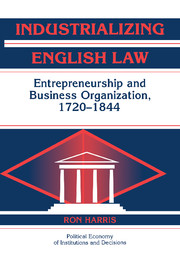Crossref Citations
This Book has been
cited by the following publications. This list is generated based on data provided by Crossref.
Kuran, Timur
2001.
The Provision of Public Goods under Islamic Law: Origins, Impact, and Limitations of the Waqf System.
Law & Society Review,
Vol. 35,
Issue. 4,
p.
841.
HICKSON, CHARLES R.
and
TURNER, JOHN D.
2003.
The Trading of Unlimited Liability Bank Shares in Nineteenth-Century Ireland: The Bagehot Hypothesis.
The Journal of Economic History,
Vol. 63,
Issue. 4,
p.
931.
Harris, Ron
2003.
The Encounters of Economic History and Legal History.
Law and History Review,
Vol. 21,
Issue. 2,
p.
297.
Floud, Roderick
and
Johnson, Paul
2004.
The Cambridge Economic History of Modern Britain.
de la Escosura, Leandro Prados
2004.
Exceptionalism and Industrialisation.
Harris, Ron
2004.
The Formation of the East India Company as a Deal between Entrepreneurs and Outside Investors.
SSRN Electronic Journal,
Assa, Natasha
2006.
How Arbitrary Was Tsarist Administrative Justice? The Case of the Zemstvos Petitions to the Imperial Ruling Senate, 1866–1916.
Law and History Review,
Vol. 24,
Issue. 1,
p.
1.
Austen, Ralph A.
and
Smith, Woodruff D.
2006.
The Economic Value of British Colonial Empire in the Seventeenth and Eighteenth Centuries.
History Compass,
Vol. 4,
Issue. 1,
p.
54.
Lamoreaux, Naomi R.
2006.
Did Insecure Property Rights Slow Economic Development? Some Lessons from Economic History.
Journal of Policy History,
Vol. 18,
Issue. 1,
p.
146.
Austen, Ralph A.
and
Smith, Woodruff D.
2006.
The Economic Value of British Colonial Empire in the Seventeenth and Eighteenth Centuries.
History Compass,
Vol. 4,
Issue. 1,
p.
54.
CARLOS, ANN M.
and
NEAL, LARRY
2006.
The micro‐foundations of the early London capital market: Bank of England shareholders during and after the South Sea Bubble, 1720–251.
The Economic History Review,
Vol. 59,
Issue. 3,
p.
498.
TREW, ALEX
2006.
Finance and Growth: A Critical Survey*.
Economic Record,
Vol. 82,
Issue. 259,
p.
481.
Guinnane, Timothy
Harris, Ron
Lamoreaux, Naomi R.
and
Rosenthal, Jean-Laurent
2007.
Putting the Corporation in its Place.
Enterprise and Society,
Vol. 8,
Issue. 3,
p.
687.
Guinnane, Timothy
Harris, Ron
Lamoreaux, Naomi R.
and
Rosenthal, Jean-Laurent
2007.
Putting the Corporation in its Place.
Enterprise and Society,
Vol. 8,
Issue. 3,
p.
687.
Mokyr, Joel
and
Nye, John V. C.
2007.
Distributional Coalitions, the Industrial Revolution, and the Origins of Economic Growth in Britain.
Southern Economic Journal,
Vol. 74,
Issue. 1,
p.
50.
Ahlering, Beth
and
Deakin, Simon
2007.
Labor Regulation, Corporate Governance, and Legal Origin: A Case of Institutional Complementarity?.
Law & Society Review,
Vol. 41,
Issue. 4,
p.
865.
SHEA, GARY S.
2007.
Financial market analysis can go mad (in the search for irrational behaviour during the South Sea Bubble)1.
The Economic History Review,
Vol. 60,
Issue. 4,
p.
742.
Freeman, Mark
Pearson, Robin
and
Taylor, James
2007.
Technological change and the governance of joint-stock enterprise in the early nineteenth century: The case of coastal shipping.
Business History,
Vol. 49,
Issue. 5,
p.
573.
Guinnane, Timothy W.
Harris, Ron
Lamoreaux, Naomi R.
and
Rosenthal, Jean-Laurent
2008.
Pouvoir et propriété dans l’entreprise. Pour une histoire internationale des sociétés à responsabilité limitée.
Annales. Histoire, Sciences Sociales,
Vol. 63,
Issue. 1,
p.
73.
Tucker, Eric
2008.
Shareholder and Director Liability for Unpaid Workers' Wages in Canada: From Condition of Granting Limited Liability to Exceptional Remedy.
Law and History Review,
Vol. 26,
Issue. 1,
p.
57.



